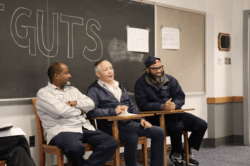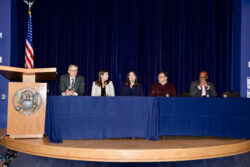Mayor Adrian Fenty advanced a proposal last Wednesday to reorganize the District’s public school system and to place authority for all school decisions in the mayor’s office, according to his web site.
Under the proposal, the Board of Education would lose its authority but would continue to serve in an advisory capacity. Line-item budget control would be given to the District Council, and modernization would be made the priority of the school construction authority, whose chief executive would be appointed by the mayor.
On his web site, Fenty said the proposal was motivated by concerns about the slow pace of development in District schools.
He said that there has been growth during Dr. Clifford Janey’s tenure as superintendent since late 2004, but progress has not been fast enough.
Councilmember Phil Mendelson (D-At Large) has opposed the proposal. Although he admits that he is dissatisfied with recent progress, he considers the proposal far too drastic, a spokesperson said yesterday. The spokesperson also said that the subordination of the Board of Education under the mayor’s office would not produce better results and would not create clear lines of accountability.
Dana Nerenberg, principal of Anthony J. Hyde Elementary School in Georgetown, said yesterday that though progress may not seem very fast when viewed from the outside, it has been proceeding rapidly from the schools’ perspective
During Dr. Janey’s tenure, the school district administration has shifted its focus from controlling the curriculum to setting higher standards, Nerenberg said. Students are expected to demonstrate their progress through standardized testing and through classroom involvement. District-issued materials may help schools to achieve those standards, but there is some of leeway in the use of those materials, especially for high-performing schools like Hyde.
MenSa Ankh Maa, principal of Jefferson Junior High School in Southwest D.C., agreed that the standards were helpful. He said that they are useful in eliminating inconsistencies among classrooms and schools, which he said are the biggest problems facing the school system.
Nerenberg and Maa both expressed optimism about the growth of education in the District, whether the proposal is accepted or not.
Maa said that the District has a very high potential. “I believe we are on the way to actualizing that,” he said.
Nerenberg added that she hoped that careful research would be put into to any plan before it is adopted.
“I hope, I mean, the term ‘results-based’ is thrown around a lot, but that we’ll take a look at what is working and thoughtful about what we invest our resources in,” she said.
In his State of the Schools address on Nov. 28, Dr. Janey cited findings by the Hoover Institution that ranked the District’s educational standards fourth in the country and that he was committed to the continuing growth of the District’s public schools.




